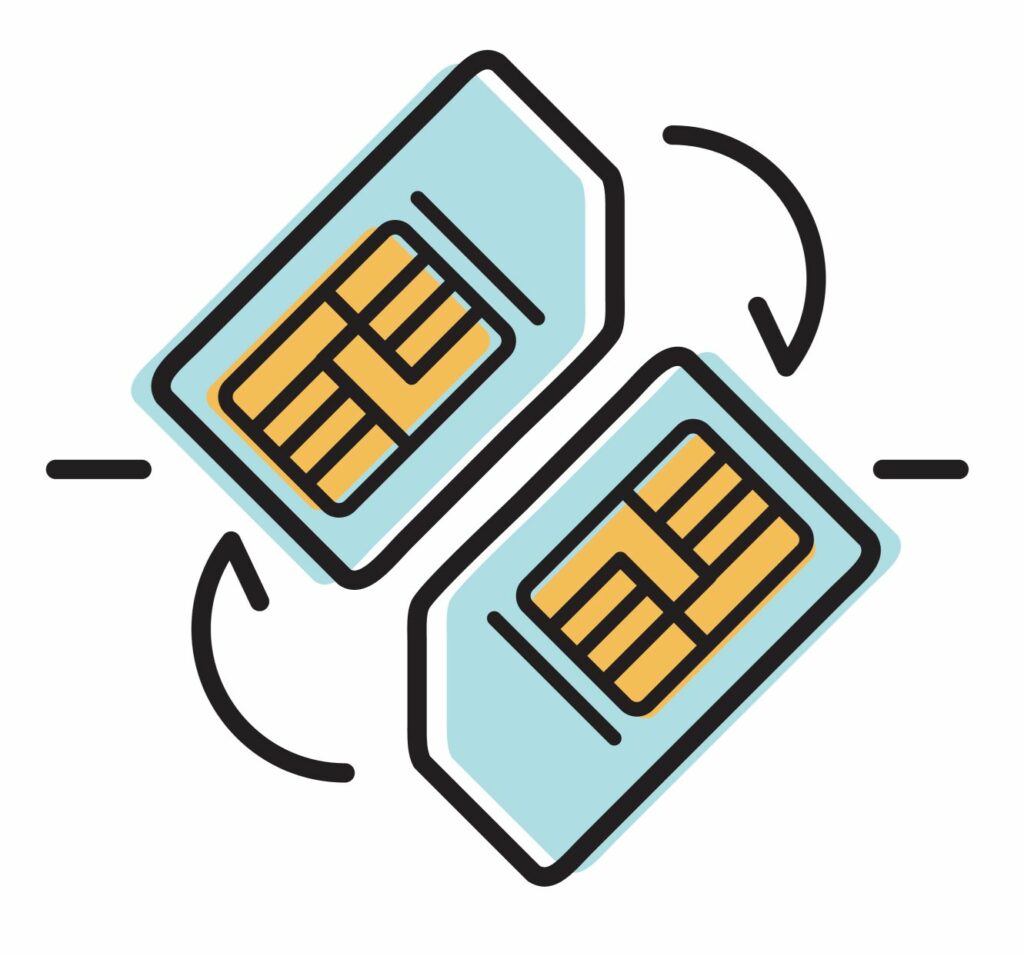When you’re dealing with cryptocurrency and cell phone providers, you always need to be aware of the latest scams out there. Two scamming methods, in particular, are causing people to lose money right now, and they’re both potentially linked to each other. This article will tell you all about the latest cryptocurrency sim card hack (cryptocurrency sim swap hack), as well as the ongoing class-action lawsuits with cell phone providers for sim hijacking. Here’s what you need to know.
What is a SIM card?
A SIM card, or Subscriber Identity Module, is a small, plastic microchip containing information that identifies users when they make calls through a mobile carrier. If you have multiple phones with multiple providers, you might swap your SIM card.
Or if you travel internationally but want to keep using your domestic number. SIM cards aren’t just used in cell phones: You can purchase them on their own or embed them into security devices like smart cards or SD cards.
Most commonly, though, they’re found inside GSM-compatible mobile phones—which makes sense because they’re identifying devices, so it would be weird to put one in a landline. They also contain phone storage space where you can store contacts, photos, and text messages.
SIM cards can be used to commit crimes: If your SIM card is hacked, a hacker can access all of your personal information through it.
While not as common as text-message scams, they’re just as dangerous: A hacker could steal your identity by stealing your personal information or trick you into calling premium numbers that cost money out of your pocket. To avoid falling victim to sim card hacks and other phone scams:
On social media sites like Facebook or Twitter, do not click on suspicious links or download attachments from untrusted people. Instead, visit known trustworthy websites directly via an address bar search or an application like Google Chrome.

What is Cryptocurrency SIM Swap Fraud?
SIM swap fraud is a crime where a criminal exploits your mobile phone number. Using the information they obtain through social engineering or data theft, criminals contact your mobile carrier pretending to be you. Then, they convince your carrier to transfer your phone number over to their device and take control of your account.
Once they have access to your account, they can hijack your cryptocurrency by draining it into their own accounts or trade off all of your fiat currency.
Common targets are cryptocurrency investors and everyday users alike. Criminals could get access to your account just by having your phone number, so it’s important to be careful about what information you share online.
Even if a hacker doesn’t have your physical phone, they could still use social engineering to obtain all of your personal information. Luckily, there are ways you can protect yourself from SIM swap fraud.
Here are some steps you can take:
- If you haven’t already done so, enable two-factor authentication on your accounts. The best way to do that is through Google Authenticator or Authy.
These apps generate a unique code every 30 seconds that changes every time you log in—even if someone has your password, they won’t be able to log in without that code. - Enable two-factor authentication on any accounts where it’s available (most major crypto exchanges support it).
If possible, don’t store large amounts of money in mobile wallets like Coinbase, Kraken, KuCoin, or Gemini. If someone gets control over your device, they’ll also have access to these wallets which makes them an easy target for criminals.
Why Would Someone Do This?
It seems like a story from a movie, but hackers are physically stealing people’s sim cards out of their phones. Here’s how it works: someone walks into your unlocked apartment, finds your phone on your nightstand (perhaps while you were sleeping) and they use a specialized device to perform what is known as sim card hacking.
This device has various parts, including an antenna that connects to a modified telephone cable that converts your voice calls into data signals. This process is used by cell phone towers to locate where we are calling from, but it can also be used by hackers to access all kinds of information stored in our phones.
We live in a world where nearly all of our data is stored on cell phones and since sim cards are used to authenticate our identity, hijackers have figured out how to use it for their own malicious purposes.
We rely on these cell phone providers to help protect us from threats like these, but hackers are able to trick your provider into handing over your private information. It’s known as sim card hijacking. There have been class-action lawsuits for sim-card swapping or SIM hijacking.

How Does Cryptocurrency SIM Card Hacking Happen?
SIM hijacking occurs when a hacker steals your mobile number. And once they have your number, they can assume your identity, reset passwords on banking accounts and take out loans.
It’s not just shady characters in back alleys using SIM hijackings to steal money from innocent people; it’s also sophisticated hackers at work. These virtual intruders use advanced technology to commit crimes that include stealing cryptocurrency wallets via SMS-based two-factor authentication.
Many cell phone providers charge fees to store cryptocurrency wallets on their servers, which is where SIM card hijackers earn their keep by intercepting text messages sent by their victims’ banks requesting cryptocurrency wallet updates.
Cryptocurrency SIM card hacking starts with a thief obtaining your phone number. Thieves can do so by either tricking you into giving them access to your private information or by getting their hands on something that belongs to you, such as your wallet, purse, or keys.
Once they have your mobile number, they can reset your online passwords, log into your cryptocurrency wallet and transfer all of its contents to their own account.
To protect yourself from virtual identity theft in general (and SIM card hijackers in particular), never store more than one password on a device you carry with you.
Also, never click on links or download apps from an unknown source because these can be malware devices designed specifically to steal private information such as mobile numbers.
The Problems With Cryptocurrencies & SIM Hijacking
One of cryptocurrency’s biggest disadvantages is that it’s difficult to acquire, especially in large quantities. Most cryptocurrency enthusiasts will tell you there are two basic ways to acquire digital coins: (1) mine them or (2) buy them on an exchange.
But here’s what most people don’t know: Since 2014, certain cell phone providers have allowed hackers to gain access to a subscriber’s account through a vulnerability in mobile networks. The hacker simulates a subscriber’s behavior patterns, meaning they can access services without ever providing an identifying password.
This hack is known as SIM hijacking, or simjacking, and could allow someone else to access your bank accounts—and even steal your identity—as if they were you.
This simjacking hack is a clear violation of privacy, but it’s also a huge scam. Without your knowledge, someone can obtain all of your account information, including passwords to online banking sites. They can then use those credentials to access those accounts without needing any identifying information at all.
What’s worse: This hack goes undetected by major banks because cell phone providers aren’t held liable for breaches in security. In fact, many providers deny that simjacking even exists—but if you ask us, that sounds suspiciously like fraud.
Are Mobile Service Providers At Fault?
There have been a number of lawsuits surrounding mobile service providers and those who have lost cryptocurrencies.
Here’s a look at some of the most popular cryptocurrencies out there — and ones that may be susceptible to hacks, if you hold them on mobile wallets.

Bitcoin (BTC)

Ethereum (ETH)

Algorand (ALGO)

Dogecoin (DOGE)

Binance (BNB)

Monero (XMR)

ZCash (ZEC)

Polygon (MATIC)
Now, there are large sums of cryptocurrencies being hacked. Here are some of the most recent crypto hacks and lawsuit updates.
Cryptocurrency Investor Sues T-Mobile (NASDAQ: TMUS) Over SIM Swap Attack.
Richard Harris, the customer and plaintiff, is alleging T-Mobile’s misconduct, including failure to adequately protect customer information, hire appropriate support staff, and violation of federal and state laws, led to his loss of 1.63 bitcoin.
Specifics-wise, Harris argues that T-Mobile violated the Federal Communications Act, which requires carriers to protect confidential proprietary information of customers and customer proprietary network information.
Hackers Swipe $36M In Crypto From IRA Financial Trust
It’s been revealed that the firm, IRA Financial Trust, which offers self-directed retirement accounts, experienced a hack that resulted in the theft of $36 million in cryptocurrency.
In a statement, IRA Financial Trust stated on Feb. 8 it discovered suspicious activity that has affected a limited subset of our customers with accounts on the Gemini cryptocurrency exchange. After discovering the issue, it launched an investigation and contacted state and federal law enforcement.
That same day, unidentified hackers drained $21 million in Bitcoin and $15 million in Ethereum from the accounts of IRA Financial Trust customers, according to a person familiar with the incident. IRA, which allows its customers to purchase cryptocurrency through a partnership with the cryptocurrency exchange Gemini Trust Co., came under cyber attack that week.
New York Man Pleaded Guilty In $20M SIM Swap Hack
A 24-year-old New York man pleaded guilty to a wire fraud conspiracy. He helped steal over $100 million worth of cryptocurrency by hacking into the victim’s cell phone provider.
Kenneth Truglia has admitted in federal court to the crime of allowing a friend to use his account at the crypto-trading platform Binance to launder more than $20 million worth of stolen virtual currency in 2018. He let his friend, who stole the coins from crypto investor Michael Terpin, use his account at the trading platform in exchange for bitcoin payments.
After Truglia stole his briefcase containing cryptocurrencies, Terpin filed a civil lawsuit against him and the jury ruled in his favor, awarding him $75.8 million in punitive damages. Later, on January 8, 2020, a New York grand jury indicted Truglia for stealing crypto.
SIM Swap Hack Victim Sues T-Mobile (NASDAQ: TMUS)
Telecommunications provider T-Mobile is the latest name to be criticized for its apparent neglectfulness, as well as its failure to protect customer information that ultimately led to a SIM swap attack and theft of $450,000, or 15 Bitcoins.
SIM swap attacks, also called port-out scams, have become increasingly popular with criminals in recent years. This type of attack usually involves the theft of a victim’s phone number, which is then used to intercept any automated messages or phone calls that would typically serve as two-factor authentication measures on a financial account or on social media.
The lawsuit filed against T-Mobile on Feb. 8 in the Southern District of New York by plaintiff Calvin Cheng — the victim who alleges he lost $450,000 in Bitcoin following such an attack — exposes precisely how telecoms firms come to play such a vital role in this type of fraud.
Closing Remarks
If you are one of the victims of sim card hijacking, then it’s time to take action against cell phone providers. Cryptocurrency is here to stay and its owners will fight for the rights of cryptocurrency holders. Join the battle against cell phone providers as we all try to put an end to crypto sim card hijackings once and for all.
This could be just the beginning, so expect more class-action lawsuits in the near future. The demand is there. Cryptocurrency owners are growing by thousands every day. If your cell phone provider is not on board or continues allowing cryptocurrency sim cards to be hacked, we suggest switching providers because they do not have your best interest at heart. Don’t let them get away with stealing your funds any longer!









